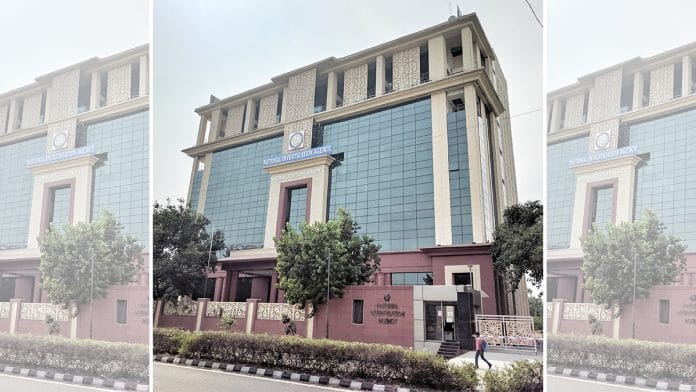New Delhi: The National Investigation Agency (NIA) Friday arrested Himachal IPS officer Arvind Digvijay Negi — who had received a gallantry award in 2017 for his investigation into the Hurriyat terror funding case — for allegedly leaking sensitive documents to over-ground workers (OGWs) of outlawed terror group Lashkar-e-Taiba.
Negi, who worked as a police superintendent with the NIA, was repatriated last year and had since then been posted in Shimla.
An NIA official on condition of anonymity told ThePrint that Negi has been arrested in connection with an OGW network case registered by the agency in November 2021. He was on the agency’s radar for around a year, the official added.
“The said case was registered on 6 November, 2011, and pertains to the spread of the network of OGWs of Lashkar-e-Taiba, a proscribed terrorist organisation, who were providing support in planning and execution of terrorist activities in India. Earlier, NIA had arrested six accused persons in the case,” the NIA said in an official statement.
“During investigation, the role of A. D. Negi, who was posted at Shimla, was verified and his houses were searched. It was also found that official secret documents of NIA were leaked by him to another accused person, who is an OGW of LeT in the case,” it further said.
The terror-funding case Negi was probing pertains to non-profit organisations, human rights and civil society groups based in Jammu & Kashmir, which the NIA suspects were raising funds in India and abroad in the name of charitable activities, and using them for carrying out “secessionist and separatist activities”.
Besides this, Negi has also probed some high-profile cases including that of DSP Davinder Singh, who was caught ferrying Hizbul Mujahideen terrorists to Jammu, the case in which Peoples Democratic Party (PDP) leader Waheed Para was arrested, the cross-border trade case, as well as Islamic State recruitment cases. It is also alleged that Negi “facilitated” bail for Para in exchange for money, a claim that is being looked into by the agency, a source in the NIA said.
Also Read: NIA asks Germany to help track Indian collaborators of Sikh ‘terror operative’ Multani
‘Passed on crucial information’
Negi, a Himachal Pradesh Police Service officer, was promoted to the rank of IPS in 2011. He served in the NIA for over 11 years, and was with the Terror Funding and Fake Currency (TFFC) unit.
Last year, Negi had sought repatriation to his home state on “personal grounds”.
An input regarding Negi’s involvement was received from the Intelligence Bureau, sources said.
According to a source in the NIA, Negi had allegedly leaked sensitive information to Khurram Parvez, a human rights activist who has also been booked by the agency in a case under the Unlawful Activities (Prevention) Act (UAPA).
Investigators also suspect that Negi leaked information to operatives across the border.
“Negi passed on some very crucial information to the main accused in the case. This also included some important leads. Secret documents were also passed on. We also suspect that some documents were also shared with operatives across the border, these include some handlers in Pakistan,” the source further said.
A raid was also conducted at Negi’s residence in Himachal Pradesh’s Kinnaur and he was also called in for questioning twice last year.
“He had been on our radar and was called in for questioning twice last year. When we confronted him with some facts, he was unable to give satisfactory replies,” the source said.
‘An extortion racket’
The agency source also said that Negi was running an “extortion racket in cahoots with a senior officer of the J&K Police” and had “huge amounts of money”.
“The crucial information regarding the investigation or the inputs with the agency was being passed on by the officer in exchange for huge amounts of money,” the source continued, adding: “During raids we have seized some incriminating documents, which we are looking into.”
Asked if more people from the J&K Police could be arrested in the case, the source said, “The case is under investigation and all angles are being explored.”
(Edited by Gitanjali Das)






